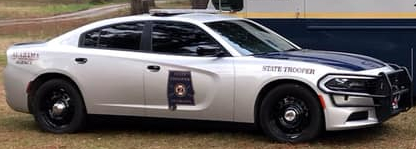MONTGOMERY – The Alabama Law Enforcement Agency (ALEA) will be joining forces with fellow law enforcement officers in neighboring states to conduct quarterly, concentrated highway traffic enforcement and educational periods throughout the state as a part of a national safety initiative known as SafeDRIVE.
SafeDRIVE, which stands for Distracted Reckless Impaired Visibility Enforcement, aims to eliminate commercial motor vehicle (CMV) traffic collisions through periods of high visibility enforcement details. The first enforcement period will take place March 1-3, along Interstate 85 and 20. Additional enforcement periods will occur June 21-23, August 2-4, October 4-6 and November 21-23.
ALEA Secretary Hal Taylor said. “Road safety is everyone’s responsibility including passenger vehicle drivers, truck drivers, bus drivers, bicyclists, motorcyclists, and even pedestrians. When traveling on our roads, we must remember that we all face a variety of safety challenges. Our goal is to eliminate dangerous driving behaviors such as aggressive or distracted driving and educate all motorists, and pedestrians, on how to share the road safely so everyone makes it home alive.”
SafeDRIVE’s enforcement efforts will include monitoring for aggressive driving, speeding, following too close, failing to wear seat belts, distracted driving, and driving under the influence. The initiative will also help ensure CMV drivers are following industry regulations and are in compliance with, hours of service, commercial driver license, medical certification, and commercial motor vehicle credentialing.
SafeDRIVE will complement a national campaign initiated by the U.S. Department of Transportation’s Federal Motor Carrier Safety Administration, Our Roads, Our Safety, which educates all motorists on how to share the road safely.
The quarterly SafeDRIVE enforcement waves emphasize the need for all vehicles to share the road safely. Commercial motor vehicle drivers are encouraged to do their part by:
- Always obey all traffic laws, wear your seatbelt, obey the speed limit, slow for work zones, and don’t drive distracted. Unsafe driving behaviors can lead to crashes and fatalities.
- Make sure your vehicle is in safe working order, and follow all regulations regarding hours of service, medical certification, and CMV credentialing and driver licensing.
- Additional tips for commercial motor vehicle drivers can be found at FMCSA’s website here.
For passenger vehicle drivers:
- Obey the speed limit and wear your seatbelt.
- Never drive distracted or impaired.
- When driving around large trucks and buses, be patient and leave more space.
- Drivers of large trucks and buses have natural blind spots: Don’t cut off commercial motor vehicles or drive on the left or right side of them for a long period of time.
- Big trucks take 40% more space to stop: Don’t follow commercial motor vehicles too closely or merge or make sudden stops directly in front of them.
Tips for bicyclists and pedestrians:
- Avoid Lingering in Blind Spots – Large vehicles have huge blind spots, making it difficult for drivers to see bicyclists and pedestrians. Avoid riding or walking behind a truck or bus that is backing up; drivers often cannot see directly behind their vehicle.
- Prepare for Wide Turns – Trucks and buses don’t maneuver as easily as smaller vehicles and need to make wide, careful turns. If a large vehicle is stopped at an intersection or about to turn right, wait for them to turn before continuing your journey and step back from the curb to be safe.
- Be Aware of Long Stopping Distances – Large trucks and buses need the length of up to two football fields to safely stop. Bicyclists should avoid merging closely in front of a moving truck or bus.
- Make Yourself Visible – In the daytime, bright clothing is best for visibility. At night or during bad weather, wear reflective clothing, use reflectors and lights on your bike, and carry a flashlight and/or wear a headlight while walking.
- Obey Traffic Laws, Signals, and Signs – Bicyclists must stop at red lights and stop signs and should ride with the flow of traffic. Pedestrians should obey signals and cross at intersections and crosswalks.
- Stay Alert and Undistracted – Using headphones can leave a bicyclist or pedestrian unable to hear sirens, horns, and other warnings. Stop walking while actively using a device. When in motion, make sure your device is away and pay attention to safety.
- Avoid Riding or Walking Impaired- Alcohol decreases motor skills and judgment whether you’re driving, on a bike, or walking. If you’ve been drinking, get a safe ride or
take public transportation.




